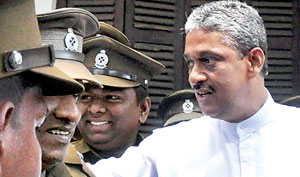“The Prosecution could have indicted both Danuna Tilakaratne and Sarath Fonseka before the High Court in respect of all charges, without charging Sarath Fonseka in the Military Tribunal,” observed Colombo High Court Judge Sunil Rajapakshe, delivering his judgment last Thursday in the Hi-Corp case.
Judge Rajapakshe upholding the Defence’s preliminary objections, acquitted former Army Commander Sarath Fonseka of cheating and criminal breach of trust, when Fonseka as Army Commander, presided over a tender board that awarded a tender to a company in which Fonseka’s son-in-law, first accused Danuna had interests.
Court having considered submissions of both parties, decided that the Prosecution could not proceed with the case against the 3rd accused, on the basis that he had been tried on the same charges before.
Defence took up the preliminary objection that 3rd accused Fonseka had been convicted by a Military Tribunal for a similar offence, and in terms of Section 314 (1) of the Code of Criminal Procedure Act, he could not be tried again by the High Court.
Court also noted the Prosecution’s argument that Fonseka had not been indicted on similar charges and for the same incident, but that, the charges in the Military Tribunal were different and for a different incident.
Delivering judgment, Judge Rajapakshe noted that the Prosecution had argued that the conspiracy charge had been preferred jointly against both Danuna and Fonseka, because 1st accused Danuna Tilakaratne was not under military authority and hence, they could not be tried together by the Military Tribunal. Hence, their joint indictment before the High Court.
The Judge pointed out that the Prosecution could not do so because, then 3rd accused Fonseka would be tried twice for the same offence, thus harassing him twice over.
Court noted that the first count in the indictment is the conspiracy charge, which the Prosecution should prove beyond reasonable doubt that the accused had engaged in fraudulent acts.
Having studied the related evidence in the Court Martial, Court concluded that the Prosecution had furnished evidence to prove that the 3rd accused had engaged in fraudulent acts.
Evidence of fraudulent acts should also be produced in order to prove the first count in the High Court that would amount to harassment of the accused, in terms of the International Covenant on Civil & Political Rights (ICCPR) and Code of Criminal Procedure Act.
The Judge further pointed out that, under these circumstances, the Prosecution should have indicted both accused in the High Court, and not try 3rd accused Fonseka before a Military Tribunal, in terms of Section 109 of the Army Act.
“In terms of Section 314 (1) of the Criminal Procedure Code and the ICCPR, an accused could not be acquitted or convicted twice for similar offences,” he noted.
The Judge also noted that the ICCPR and the Code of Criminal Procedure Act should be given prominence, and thus overruled the objection of the Prosecution, based on Section 77 of the Army Act.
Prosecution took the stand that conviction by the Military Tribunal would not be a bar to try the 3rd accused in the High Court, in terms of Section 77 of the Army Act.
However, Court noted that, as the Military Tribunal is recognised by the Supreme Court, as a court with proper jurisdiction, the Military Tribunal is also subject to the ICCPR Act passed by Parliament.
Court also noted that the uncertainty of whether the Military Tribunal constitutes a proper court or not, could have been the reason for the 3rd accused to be charged before two courts. |


